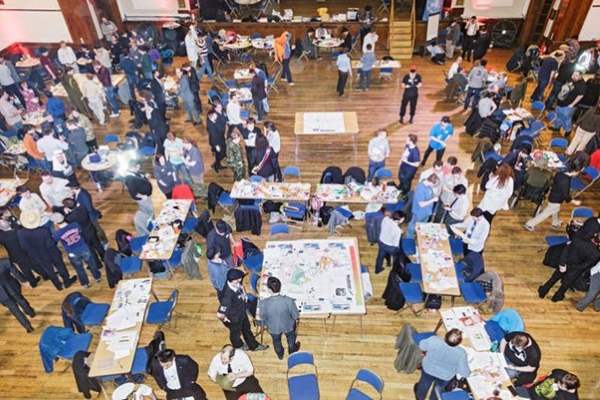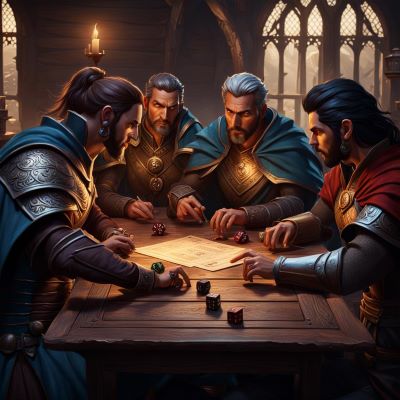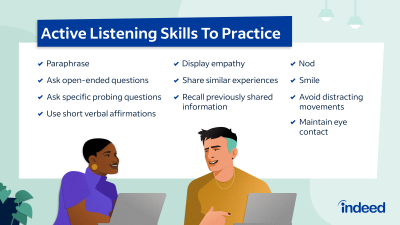Although not well known, Megagames stand as the ultimate immersive experience, blending elements of role-playing, board games, and live-action simulations. These large-scale games, often involving dozens to hundreds of players, create complex and dynamic environments. This structure and emergent play style really puts players through their paces. Notably, I believe that Megagames could be an exceptional in fostering leadership skills. This article delves into what Megagames are, provides specific examples, and explores how they might be used to enhance leadership skill through experiential learning.
What Are Megagames?
Megagames are large-scale games that combine elements of strategy, role-playing, and simulation, often played out over an entire day. They typically involve multiple teams, each with distinct roles and objectives, interacting within a shared narrative framework. The complexity and scale of these games demand coordination, strategic thinking, and adaptive problem-solving from players.
The design of Megagames allows for rich, emergent gameplay, where the actions of individual players and teams can significantly influence the overall outcome. This dynamic environment mirrors real-world scenarios, making Megagames not only entertaining but also educational.
Examples of Megagames
While I have explained what a Megagame is, it really takes some examples to showcase their scale and complexity. Here are some better known examples.
1. Watch the Skies
One of the most well-known Megagames, “Watch the Skies,” involves teams representing nations and alien factions navigating a world where extraterrestrial contact has just been made. Each team must manage resources, conduct diplomacy, and respond to various crises, all while dealing with the unknown intentions of the aliens.
“Watch the Skies” has been run by numerous organizations across the UK, USA and Australia and there are some great videos exploring the players experiences.
For more information, you can visit the Stone Paper Scissors website here.
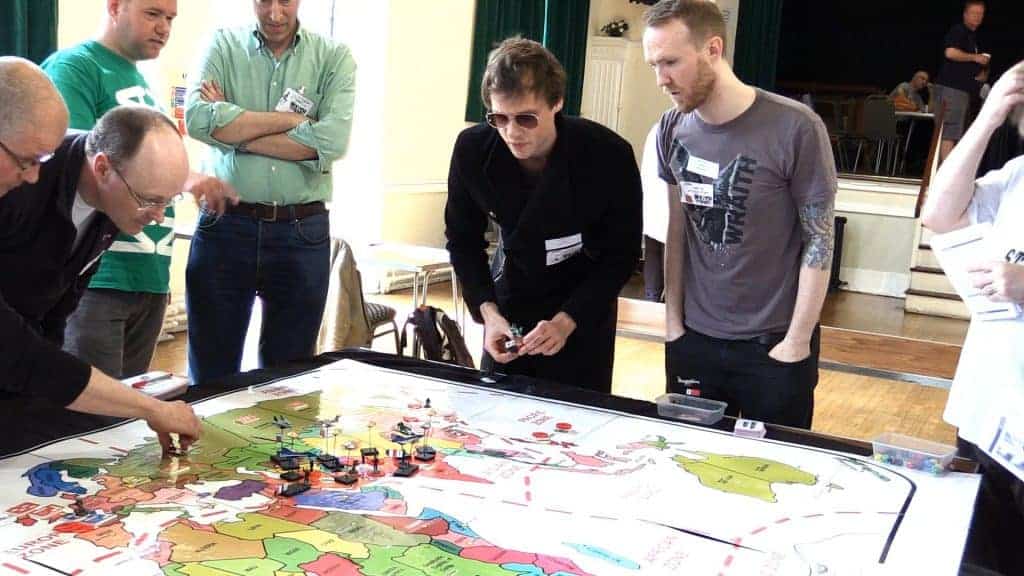
2. Den of Wolves
“Den of Wolves” places players in the roles of the crew and passengers of a fleet of spaceships escaping a dying star system. Players must manage limited resources, make critical decisions about survival, and navigate complex interpersonal dynamics. Leadership roles within the fleet are crucial for the game’s progression.
Further details are available from the South West Megagames. Interestingly they also run games for businesses and other organizations, already proving the concept that games of these sort can build leadership skill and ability.
3. Urban Nightmare: State of Chaos
Written by Megagame stalwart Jim Wallman, “Urban Nightmare: State of Chaos,” throws players into a zombie apocalypse affecting an entire state. Teams represent various governmental and non-governmental organizations working to manage the outbreak, maintain public order, and ensure survival. The game emphasizes crisis management and inter-agency cooperation. A great game to play if a business is experiencing low communication or significant silo-ing between departments.
You can explore more about this game here. A great review can be found on the BeckyBecky blog.
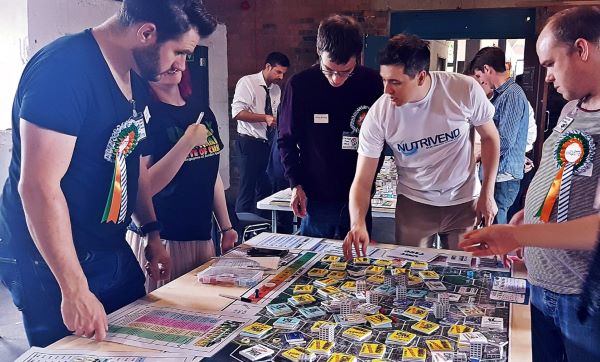
Megagames and Leadership Development
The immersive and multifaceted nature of Megagames makes them an excellent platform for developing leadership skills. surprisingly, they are already being used in this capacity. Both Stone Paper Scissors and SW Megagames are hosting games in the corporate and government spheres.
Here’s a few reasons why these games are so effective:
1. Strategic Thinking and Planning
Megagames require players to think strategically and plan ahead. In “Watch the Skies,” for example, national leaders devise long-term strategies while preparing to adapt to rapidly changing circumstances, mirroring the need for strategic foresight in leadership roles.
2. Decision-Making Under Pressure
Megagames often place players in high-pressure situations where quick, decisive action is necessary. “Den of Wolves” challenges players to make critical decisions about resource allocation and crisis response, honing their ability to make sound decisions under stress.
3. Collaboration and Teamwork
Success in Megagames relies heavily on effective teamwork and collaboration. Players must communicate and coordinate with their teammates and other groups to achieve their objectives. This aspect is particularly evident in “Urban Nightmare: State of Chaos,” where various agencies must work together to manage the zombie outbreak.
4. Conflict Resolution
Megagames simulate environments where conflicts of interest are common, requiring players to negotiate and resolve disputes. These skills are directly transferable to leadership scenarios where conflict resolution is a daily necessity.
5. Adaptability and Flexibility
The dynamic nature of Megagames demands that players be adaptable and flexible. Unexpected events and actions by other players can drastically alter the game landscape, requiring leaders to pivot and adjust their strategies. This mirrors real-world leadership scenarios where adaptability is key to navigating uncertainty.
Final Thoughts
Megagames offer a unique and powerful means of developing leadership skills through their complex, interactive, and immersive gameplay. By simulating real-world scenarios and challenges, they provide players with opportunities to enhance strategic thinking, decision-making, teamwork, conflict resolution, and adaptability. As these games continue to grow in popularity, their potential as tools for leadership development becomes increasingly apparent.
As such, I’ve been interested in running one of these behemoths for a long time. I’m currently writing a smaller version for 12 players and I’ll report back once I’ve actually run it. As a side note, if you’re in Perth, Australia and would like to play in a Megagame drop me a line. A game this size will need plenty of players!

